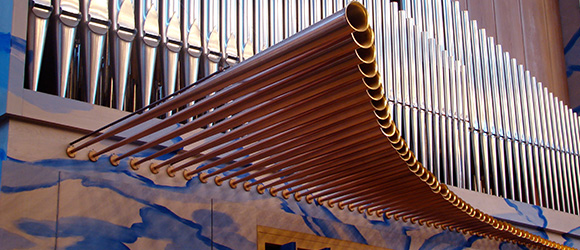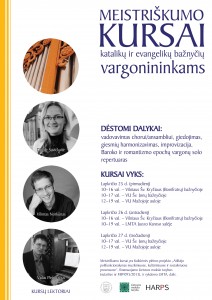Master class for church organists
- 2013-11-05
- | News

On November 25–27, 2013, Vilnius will host a master class entitled “A church organist as a polyfunctional cultural figure” for organists working for Catholic and Evangelical churches.
The master class will take place at:
• Church of Sts Johns (Šv. Jono g. 12): November 25th and 27th, 10:00 to 17:00
• Vilnius University, Small Aula Hall (Šv. Jono g. 3): November 25th and 27th, 12:00 to 19:00
• Lithuanian Music and Theatre Academy (LMTA), J. Karoso Hall (Gedimino pr. 42): November 26th, 10:00 to 19:00
• St Cross (Bonifrater) Church (S. Daukanto a. 1): November 25th and 26th: 10:00 to 16:00
 The profession of a church organist has one of the most far-reaching traditions among the musical professions in Europe and in Christian Lithuania (since 1387). The profession of an organist spans a very broad range of roles including a soloist, a choir manager, a conductor, a vocal specialist, an improviser, a liturgical connoisseur and often, with a lack of church repertoire, also a composer. Many renowned composers used to play organ in a church at the dawn of their professional careers. In the late 19th century and the first decades into the 20th century, in Lithuania organists played a vital role of spreading musical culture, educating the public and organising cultural life. They were the ones to initiate a movement of choirs, which then developed into Lithuania-wide song festivals and made a valuable contribution to Lithuania’s strive for independence.
The profession of a church organist has one of the most far-reaching traditions among the musical professions in Europe and in Christian Lithuania (since 1387). The profession of an organist spans a very broad range of roles including a soloist, a choir manager, a conductor, a vocal specialist, an improviser, a liturgical connoisseur and often, with a lack of church repertoire, also a composer. Many renowned composers used to play organ in a church at the dawn of their professional careers. In the late 19th century and the first decades into the 20th century, in Lithuania organists played a vital role of spreading musical culture, educating the public and organising cultural life. They were the ones to initiate a movement of choirs, which then developed into Lithuania-wide song festivals and made a valuable contribution to Lithuania’s strive for independence.
The master class “A church organist as a polyfunctional cultural figure” will offer a wide range of subjects based on the relevant aspects of an organist’s profession delivered by Lithuanian musicians Vilimas Norkūnas, Dr Vidas Pinkevičius and Dovilė Savickaitė with professional experience from universities in Europe (Germany, Austria and the Netherlands) and in the U.S. They will share many-sided experience of a church organist, a choir manager and a conductor and will instruct on improvisation, chant and chorale harmonisation, chant performance and accompanying with an organ. Church organists will have the opportunity to gain a practical insight into the relevant organ repertoire from the Baroque and Romanticism eras and to brush up their theory and historic knowledge.
Offering a wide range of disciplines, the master class will be a good chance to prepare for organist competitions focused on the polyfunctional profession of an organist, which blends the various areas of the art of organs, and a valuable addition to the professional excellence of organists working at Lithuanian churches.
The master class is a part of the cultural development project “Performer’s Polyfunctionality in Musical, Cultural and Social Processes” funded by the Lithuanian Research Council (Contract No MIP-095/2013) and implemented by the LMTA lecturers Dr Rūta Lipinaitytė, Dr Eglė Šeduikytė-Korienė and Lina Navickaitė-Martinelli.
The lecturers and participants of the master class will be involved in the research process as they will be interviewed by the project promoters. The analysis of the artistic areas of the organist’s musical profession that boasts one of the most far-reaching traditions in Europe (church musical art, the traditions of concert organ playing, creative heritage of organists, the repertoire and the art of improvisation, the traditions of organ making, pedagogical, cultural and educational activities) will be followed by examining the functions and topicalities of the contemporary many-sided profession of an organist.

